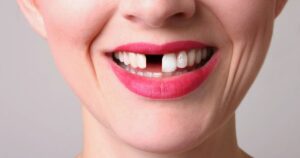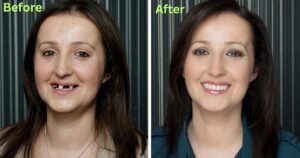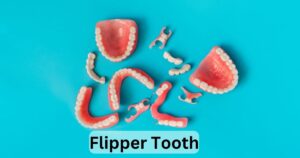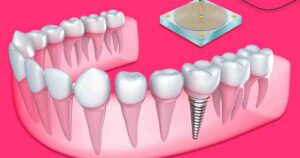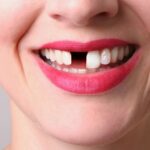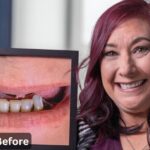Wearing ill-fitting dentures can lead to sinus problems. When dentures don’t sit right in your mouth, they can affect your sinuses. This happens because they may press on your sinus passages. This pressure can cause discomfort and sinus issues, like congestion and headaches. So, it’s important to have well-fitted dentures to avoid these problems.
Many don’t realize that the answer to the question, Can ill-fitting dentures cause sinus problems? might be a resounding yes. Imagine this: your dentures, those seemingly harmless replacements for your natural teeth, could be causing the congestion, discomfort, and headaches you’ve been enduring.
If you’ve ever wondered about the link between ill-fitting dentures and sinus problems, you’re not alone. Now that you know there might be a connection, it’s essential to take action. Don’t let discomfort and sinus issues persist; reach out to a dentist for a denture check today. Your path to better oral health and sinus comfort starts with a simple call.
What Causes Poor-Fitting Dentures?
Poor-fitting dentures can be caused by several factors. Firstly, changes in the mouth’s shape and size over time can lead to ill-fitting dentures. This happens because the jawbone naturally shrinks, affecting how dentures fit.
Another common cause of ill-fitting dentures is weight loss, as it affects the tissue beneath the dentures. Denture wearers might experience a loose fit if they’ve lost weight. Additionally, dentures that are too old or have experienced wear and tear can become less effective.
5 Serious Health Consequences Of Ill-Fitting Dentures
Ill-fitting dentures can lead to several serious health consequences. Here are five of them:
| Health Consequence | Description |
| Oral Sores and Irritation | Dentures that don’t fit properly can cause friction and pressure on the gums, leading to painful sores and chronic irritation in the mouth. |
| Difficulty Chewing and Digestive Problems | Poorly fitting dentures can make it challenging to chew food properly, potentially leading to digestive issues as food isn’t broken down as it should be. |
| Speech Problems | Ill-fitting dentures can affect speech, causing slurring or mumbling, which can lead to social and communication difficulties. |
| Bone Resorption | When dentures don’t fit well, the jawbone may begin to deteriorate over time, resulting in a sunken facial appearance and additional oral health issues. |
| Infections and Gum Disease | Poorly fitted dentures can create spaces where bacteria can thrive, leading to gum infections and periodontal disease if not properly addressed. |
It’s essential to consult a dentist if you suspect your dentures are ill-fitting to avoid these health consequences and ensure a better quality of life.
Can Ill-Fitting Dentures Cause Sinus Problems?
Ill-fitting dentures might lead to sinus problems. When dentures don’t fit well, they can make you breathe through your mouth more, which might dry out your sinus passages. Dry sinuses can lead to discomfort and even sinus infections. If you have a missing tooth, it’s essential to consider options like getting a denture for one tooth to ensure proper fit and prevent such issues.
Poorly fitting dentures can create pressure on your upper jaw, potentially affecting your sinuses. This pressure might lead to pain and sinus congestion. It’s important to have well-fitted dentures to avoid these potential sinus issues.
Case Of Foreign Objects In Sinuses
Foreign objects in sinuses are a serious problem. People might accidentally inhale or insert small items, like beads or food, into their nasal passages. This can cause pain, difficulty breathing, and even infections.
Doctors must remove these objects quickly. They often use special tools to gently take out the foreign items. It’s crucial to seek medical help if you suspect something’s stuck in your sinuses to prevent complications and ensure a swift recovery.
Symptoms Of Denture Lining Fragments In Sinuses
When denture lining fragments enter your sinuses, you might experience some symptoms. These can include nasal congestion, a bad taste in your mouth, or difficulty breathing through your nose. If you suspect this issue, consult your dentist for evaluation and treatment. Ignoring these symptoms could lead to further complications.
Other Sinus Problems Causes By Ill-Fitting Dentures
Ill-fitting dentures can lead to other sinus problems. When dentures don’t fit well, they might cause irritation in your mouth and gums. This irritation can extend to your sinuses, leading to discomfort.
Ill-fitting dentures can create pressure on your upper jaw. This pressure can affect your sinus passages, causing congestion and sometimes even sinus infections. Therefore, it’s crucial to ensure your dentures fit properly to avoid these sinus-related issues.
Pressure And Discomfort On The Sinus Area
When you have pressure and discomfort on the sinus area, it can be quite bothersome. Sinus problems often cause this. It feels like a heavy feeling on your face. You might also have a headache. To relieve it, you can try warm compresses and rest. If it persists, consult a doctor for advice.
Effect Of Improper Bite Alignment On Sinus Health
Improper bite alignment can affect sinus health. When your teeth don’t come together correctly, it can lead to sinus issues. This misalignment can put pressure on your sinuses, causing discomfort. It may also hinder proper sinus drainage, potentially leading to sinus infections. So, taking care of your bite alignment is important for your overall sinus health.
Nasal Congestion And Postnasal Drip
Nasal congestion happens when your nose feels stuffy. It’s hard to breathe through it. You might get it when you have a cold or allergies. Postnasal drip is when mucus runs down the back of your throat. It can make you cough or clear your throat a lot.
Both nasal congestion and postnasal drip can be bothersome, but they usually go away on their own. You can try over-the-counter remedies or home remedies to feel better. If they last a long time or get worse, it’s a good idea to see a doctor for advice.
Do Dentures Affect Your Sinuses?

Dentures can affect your sinuses. When you wear dentures, especially upper ones, they can take up space in your mouth. This may lead to changes in the way air flows through your nasal passages, potentially impacting your sinuses.
Dentures can block the natural movement of your palate, which can affect the flow of air into your nasal passages. This might lead to sinus issues or discomfort. It’s essential to consult your dentist if you suspect your dentures are affecting your sinuses to find a solution that works for you.
Side Effects Of Ill-Fitting Dentures
Ill-fitting dentures can lead to discomfort. They may cause sore spots and ulcers in your mouth. Eating and speaking can become difficult when dentures don’t fit well. Poorly fitting dentures might affect your self-esteem. You may feel self-conscious about your smile.
Regular check-ups with a dentist can help prevent these side effects and ensure comfortable, well-fitting dentures. Don’t hesitate to seek professional guidance for a better dental experience.
Dental Sinus Infection Symptoms
Dental sinus infection symptoms can be uncomfortable. You might feel pain in your upper teeth. Your face could swell up. Sometimes, you’ll have a bad taste in your mouth. It might be hard to breathe through your nose.
When you have a dental sinus infection, your dentist can help. They’ll check your teeth and gums. If it’s an infection, they’ll treat it. Don’t wait if you have these symptoms. It’s important to get help early.
Can dental work damage your sinuses?
Dental work can sometimes affect your sinuses. When dentists perform procedures on your upper teeth, like root canals or extractions, they’re close to your sinus cavities. Occasionally, there might be a small risk of causing a sinus infection or sinusitis if there’s a complication or if the sinus membrane is perforated.
It’s essential to communicate openly with your dentist about any concerns, like sinus issues or allergies, before dental procedures. They can take precautions and use techniques to minimize the chances of sinus problems arising.
FAQ’s
Can ill-fitting dentures really cause sinus problems?
Yes, they can. When dentures don’t fit well, they may press on your sinuses, leading to discomfort and issues.
What are the signs of denture-related sinus problems?
Common signs include congestion, headaches, facial discomfort, and sinus pressure.
Can I fix my dentures at home to prevent sinus problems?
It’s best to visit a dentist for adjustments. Home fixes may worsen the problem.
Conclusion
The link between ill-fitting dentures and sinus problems is indeed significant. Ill-Fitting Dentures Cause Sinus Problems. Dentures that don’t fit well can press on your sinuses, leading to discomfort and symptoms like congestion and headaches. It’s crucial to address these issues promptly for a better quality of life.
Regular dental check-ups, typically every 6–12 months, can ensure your dentures fit correctly, reducing the risk of sinus-related problems. If you’ve been suffering from sinus discomfort or persistent symptoms, consider visiting your dentist. Properly fitted dentures can make a world of difference in your daily comfort and well-being.

